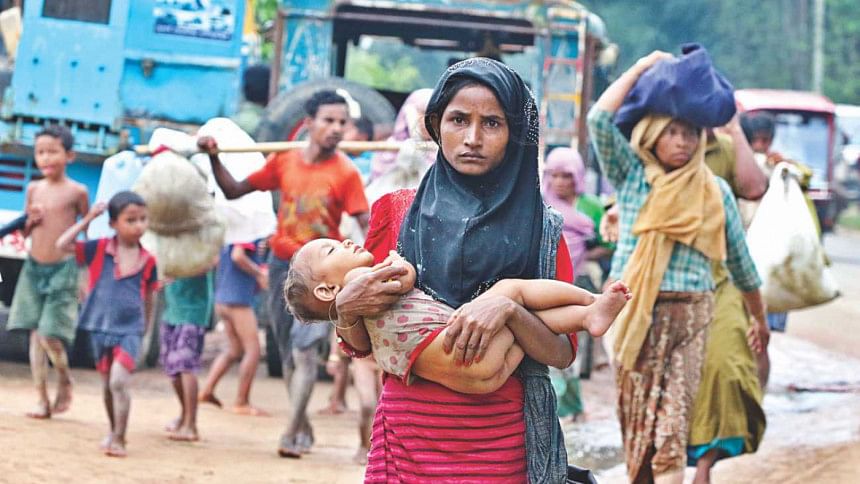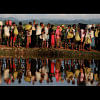The Myanmar Cauldron: Birth of Arsa

At the grand Oslo City Hall on a June afternoon in 2012, Aung San Suu Kyi delivered her Nobel lecture and uttered the very fundamental truth of any conflict: "Whenever suffering is ignored, there will be the seeds of conflict, for suffering degrades and embitters and enrages."
Only a year down the line, her words became true for Myanmar when an armed group styled the Arakan Rohingya Salvation Army or Arsa emerged in Rakhine state in 2013.
Intent on taking revenge on the killing machine of Myanmar, the Arsa insurgents launched their first attack in October last year and killed nine policemen, sparking a new wave of persecution on the Rohingyas by the Myanmar military.
Its second attack came on August 25, sparking another genocide on the Rohingyas, seen as the most persecuted people in modern time.
As Suu Kyi had said, the emergence of such an armed group was inevitable in Myanmar where the Rohingyas are considered as nothing more than mere insects to be annihilated, where they have no rights, no citizenship and no protection. History has seen the rise of such groups like the Chechen rebels and the Tamil Tigers.
The Palestinian struggle is an epitome of long-drawn conflict arising out of total disregard for and repression on a specific people with the outcome of emergence of armed groups like Hamas.
For now, Arsa seems just a small band of enraged people. They have no modern weapons – the recent two attacks on Myanmar forces were made with machetes and a few small arms. For now, it is a group that has no sizable weaponry to sustain the struggle. But that is how things remain in the beginning – small but potent.
Small because as reports indicate, Arsa does not have more than 1,000 fighters under its fold.
But potent because it is could turn to be a diaspora-led movement – over 500,000 living in Pakistan and Saudi Arabia -- that has its reach way beyond the borders.
Brussels based the International Crisis Group (ICG) in its 2016 report titled :Myanmar: A new Muslim insurgency in Rakhaine state" said Arsa is directed by Rohingyas based in Mecca and Medina.
The pedigree of Arsa leader Ataullah Abu Ammar Jununi, who often appears in videos to castigate the Myanmar junta's actions, is also worrisome. He was born in Karachi in Pakistan and raised in Saudi Arabia, the breeding ground for Wahabism.
The ARSA's origin is the Harakah al-Yaqin short-titled HaY (Faith Movement), also raised by Ataullah.
As the ICG report says, Ataullah is identified by the Myanmar government as Hafiz Tohar and HaY as Aqa Mul Mujahidin in Arabic, the meaning of which is communities of fighters.
ICG also says Arsa gets its funding from Rohingya diaspora as well as from major private donors in Saudi Arabia and the Middle East.
Although so far nobody is saying that Arsa has any religious motivation in its struggle, but Islamist outfits like the IS and al-Qaeda look out for such Muslim enraged groups to raise their army of extremists. It is now anybody's guess whether Arsa will be drawn into such a cauldron in future.
Arsa's actions would only draw more military crackdown on Rohingyas in Myanmar. And the crackdown would make it easier for Arsa to recruit more members and draw more funds from abroad. A vicious cycle of violence would follow leading to an uncertain future for the region and the world as well.
Bangladesh, which is deeply committed to fighting terrorism, has a lot of reasons to be worried too. It has so far shown good diplomatic gestures towards Myanmar. But an insurgent group next door is unnerving. The insurgent group may have links to international terror groups as various outfits have earlier expressed sympathy to the persecuted Rohingya community and called for retaliation.
Bangladesh has patiently been handling the influx of Rohingyas into its territory for around four decades since 1978. It has demonstrated good gesture and never taken the issue to any international forum against Myanmar. It has been maintaining good relation with the neighbour. Now Myanmar should reciprocate Bangladesh's good gesture and take effective measures for repatriation of the Rohingyas.

 For all latest news, follow The Daily Star's Google News channel.
For all latest news, follow The Daily Star's Google News channel. 








Comments